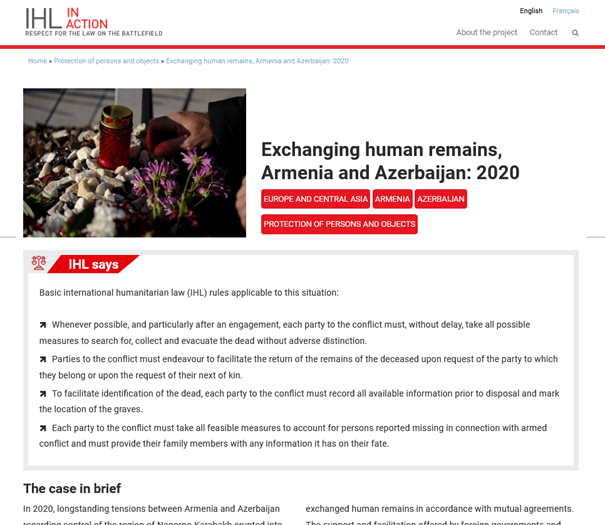By: Sonia Crenn
Reference librarian – international humanitarian law
International Committee of the Red Cross (ICRC)
Member of the IALL Board of Directors
This week marked the 75th anniversary of the adoption of the Geneva Conventions. These four Conventions, adopted on 12 August 1949, protect people who are not, or are no longer, taking part in the fighting during an armed conflict. They represent a significant milestone in the development of international humanitarian law and are universally ratified. The are also arguably one of the rare multilateral treaties that can be invoked in a popular podcast or fictional movie and most people will have at least a vague idea of what they stand for.
Reading the news however, we are constantly reminded of the harm violations inflict upon civilians, prisoners of war, medical personnel and others affected by armed conflict. War is inherently destructive and will always cause suffering, of course, but we mustn’t lose sight of the difference compliance with the rules of the Geneva Conventions — and international humanitarian law (IHL) in general — can make for people who are caught up in war. This is why I wanted to take the opportunity to highlight an interesting resource my colleagues at the International Committee of the Red Cross (ICRC) have created: the IHL in action database.
As part of its mission to protect and assist people affected by armed conflict, the ICRC has long been working to influence behavior to ensure greater respect for IHL. In recent years, a focus has been placed on changing the narrative on IHL. As my colleagues explained,
“The IHL in Action platform collects real-life examples of respect for IHL by belligerents around the world in order to counter the erroneous perception that IHL is ‘always violated and never respected’. It demonstrates that not only is IHL more often respected than media coverage may have us believe, but that belligerents often believe it is in their interest to comply with it.”[1]
Juliane Garcia Ravel and Madalena Vasconcelos Rosa
The case-studies have been selected, researched and drafted in collaboration with IHL clinics from Emory University School of Law, Leiden University, Reichman University and Roma Tre University. They can be searched by country or by topic. Cases include a reminder of the basic IHL rules applicable, a summary of the specific situation and a discussion section at the end.

Overall, the platform brings nuance to the picture that emerges from media reports, underlining the complex reality of armed conflict, where both instances of respect for and violations of IHL may occur, and where practices may evolve over time. A valuable resource for teaching, the cases can also help orient research on a particular context and enrich academic papers with state or non-state armed groups practice. Feedback from librarians is always valuable, so do not hesitate to leave a comment below or write to my colleagues directly if you have questions or suggestions for improvements!
More resources on the Geneva Conventions:
The ICRC’s database of IHL treaties includes the text of the four Geneva Conventions, information on state parties and ratification dates and the article-by-article commentaries currently being updated.
This research guide on the drafting history of the Conventions includes the digitized travaux preparatoires and proceedings of the 1949 diplomatic conference.
[1] https://blogs.icrc.org/law-and-policy/2020/11/19/ihl-in-action-seven-patterns-respect/
This Blog contains entries by members of the International Association of Law Libraries on issues germane to the Association’s areas of focus. Views expressed in an individual entry only represent the views of the author, and not those of the International Association of Law Libraries or the author’s employer.
